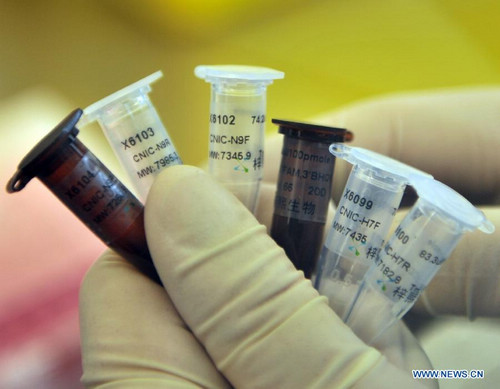Public advised against poultry slaughtering
 0 Comment(s)
0 Comment(s) Print
Print E-mail Xinhua, April 4, 2013
E-mail Xinhua, April 4, 2013
Chinese public have been advised against slaughtering poultry for ancestral worship on the upcoming Tomb-Sweeping Day as authorities strengthen H7N9 bird flu control efforts after three deaths of the newly-found strain that has not previously been detected in humans.
|
A technician holds test reagents for H7N9 bird flu virus at the Beijing Center for Diseases Control and Prevention in Beijing, China, April 3, 2013. [Xinhua] |
The Tomb-Sweeping Day that falls on Thursday will be an occasion to commemorate the dead, when traditionally some southern Chinese regions have the convention of killing poultry for ancestral worship.
Feng Zijian, director of the health emergency center of the Chinese Center for Disease Control and Prevention (CDC), reminded the public to take precautions against the virus in crowded places and not to contact poultry during the upcoming Tomb-Sweeping holiday on April 4-6.
Feng suggested the public not to contact birds or chickens during worship rituals so as to reduce the risk of contracting the H7N9.
Two infections of H7N9 avian influenza, involving one death, have been reported in east China's Zhejiang Province, bringing the total number of infected people in the country to nine.
Seven other H7N9 bird flu cases had been reported previously, two in Shanghai, one in Anhui and four in Jiangsu. The two in Shanghai died and the other five are in critical condition under treatment in Nanjing, capital of Jiangsu.
The World Health Organization reported the earlier cases on Monday.
LESS HARMFUL THAN SARS
Feng denied the possibility that the H7N9 could be developed into a public health incident like SARS (Severe Acute Respiratory Syndrome) 10 years ago, which claimed the lives of several hundred people on the Chinese mainland, Hong Kong and Taiwan, by being transmitted through humans.
"H7N9 is completely different from SARS, and those who had contact with the nine patients have no relevant symptoms," Feng said.
"No human-to-human transmission of H7N9 has been discovered and no epidemiological connection between these cases has been found so far," he said.
With enhanced monitoring, more H7N9 cases will be found in the future, Feng warned.
He also denied links between H7N9 and dead pigs retrieved from Shanghai rivers. "So far, no direct etiology evidence has been obtained from poultry and pigs, with investigations underway."







Go to Forum >>0 Comment(s)